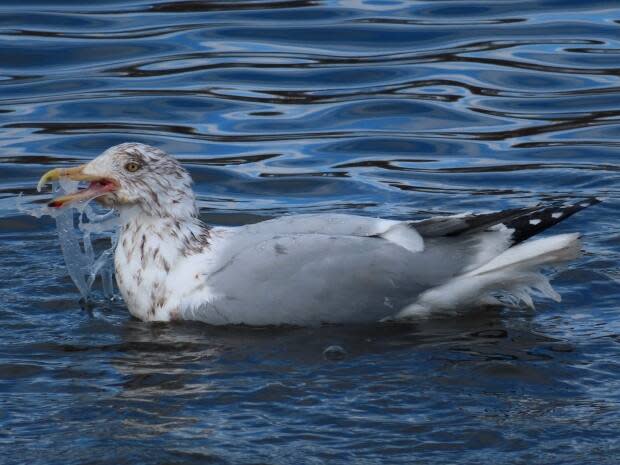Gull snared by medical mask has biologists calling for awareness around PPE pollution

Seabird biologists are concerned about medical masks ending up in the province's waterways and entangling birds and other wildlife after images were posted online of a gull at Quidi Vidi Lake trapped in the ear loop of a mask.
"It's incredibly disheartening and discouraging. It would be anyway, but this lake has an international designation as an important bird area," said Holly Hogan, who has been studying marine birds for 30 years.
Hogan told CBC Radio's The Broadcast another image from the same set shows another gull with the plastic rings from beer cans around its beak.
Hogan said an awareness around plastic pollution in the environment, specifically the ocean, already exists, but when single-use personal protective equipment became a staple during the COVID-19 pandemic, she said pollution was the first thought that occurred to her.
"Everybody disposing of these single-use masks, I thought 'where are they going to go?' and well, we know where some of them are ending up, unfortunately," she said.
Hogan said about 129 billion face masks and 69 billion disposable gloves were used every month in 2020.
"Not surprisingly, a large number of these ended up in the ocean, and there are very conservative estimates between 1.5 and two billion face masks ended up in the ocean in 2020," she said.
Single-use mentality
Hogan said there's a feeling of stepping backwards in the public's attempt to limit plastic use.
Using bulk food retailer Bulk Barn as an example, she said people used to be able to bring reusable containers to the store, but during the pandemic, the store handed out single-use plastic gloves to be worn while shopping and didn't allow reusable containers.
"Some of it is certainly justified, people need to protect their health and that is the number one priority," Hogan said.
"Not to pick on the Bulk Barn, I mean they're doing it for our safety, but it seems like in the face of the pandemic, people are almost in a state of panic."

Not many people are aware that the single-use non-medical masks they're buying and discarding are made from plastics, meaning they won't break down in a landfill, Hogan noted.
She said masks break down into micro-plastics, creating other health problems for the environment.
"As an intact mask, with its loops, it entangles creatures, potentially. But it is, and it remains, plastic waste in the environment doing the damage that all plastics do," she said.
So, what's the solution? Hogan says awareness and education should be the main focus.
"These things don't disappear when they leave your hands or when they leave your face," said Hogan.
"Cut off the ear loops so that if they do unintentionally end up in the environment then they're not suddenly a nuisance for some animal."

